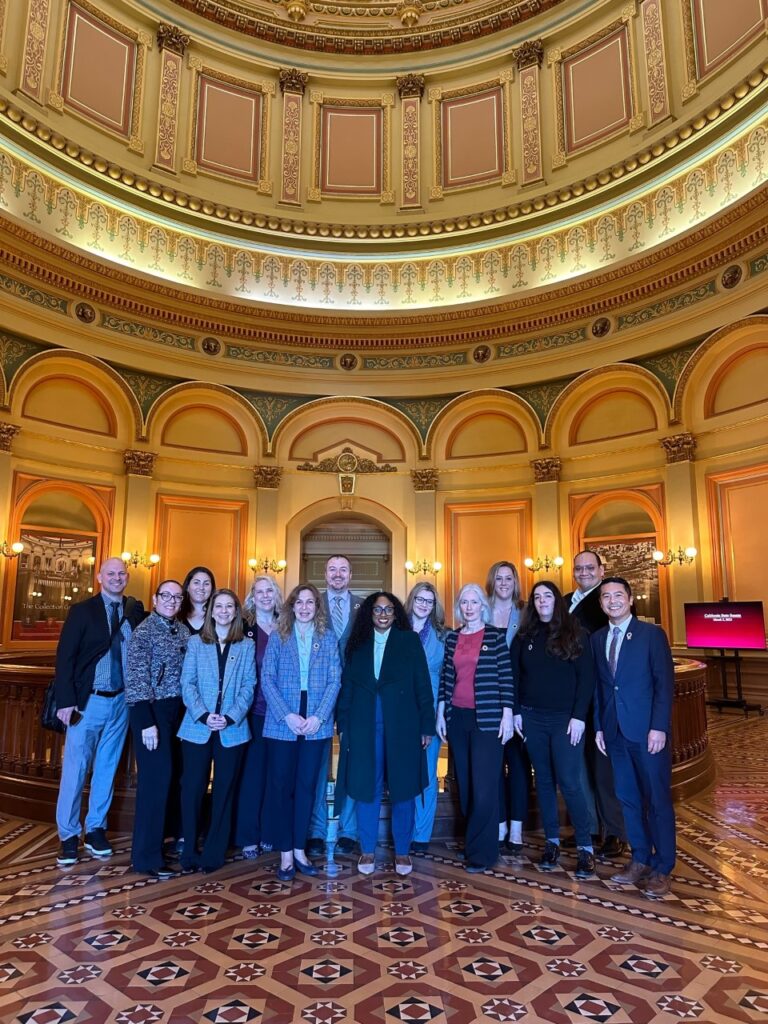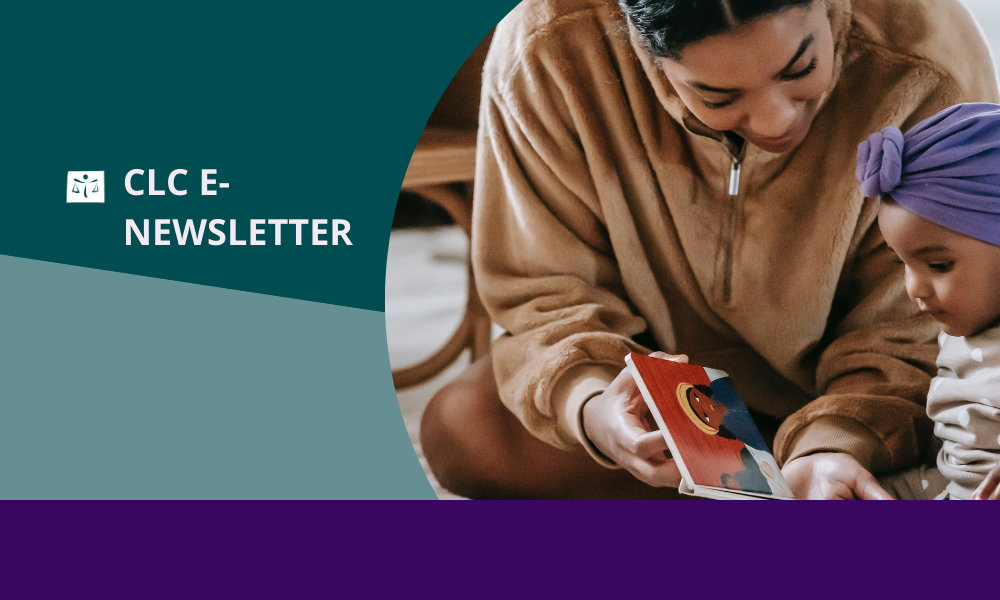CLC is a proud leader in policy advocacy and system reform work. Our policy team is a group of dedicated professionals who work at the local, state, and national level to improve the child welfare system. Our team ensures that our work is informed by the voices and experiences of the tens of thousands of children and youth we represent each year. Learn more about our Legislative priorities and our dedicated policy team in our latest newsletter.
Legislation and Policy Update!
CLC is a proud leader in policy advocacy and system reform work. Our policy team is a group of dedicated professionals who work at the local, state, and national level to improve the child welfare system. Our team ensures that our work is informed by the voices and experiences of the tens of thousands of children and youth we represent each year.
We are thrilled to share that since 2000, CLC has successfully sponsored over 60 pieces of legislation, including bills that have helped to protect sibling rights and relative placements, extended foster care up to age 21, and more. We have also led a statewide advocacy effort to increase funding for dependency counsel statewide, which resulted in a significant reduction in caseloads for attorneys for children and parents.
To learn more about CLC’s policy work and our 2023 sponsored legislation, please visit Legislation and Policy – Children’s Law Center of California (clccal.org) or contact CLCPolicyTeam@clccal.org.
Staff Spotlight: Meet CLC’s Policy Team
Director of Policy and Training, Luciana Svidler
Luciana Svidler has been with CLC for over 15 years. She joined as a staff attorney representing children in Los Angeles County Dependency Court.
Luciana joined the policy team in 2017 and was recently appointed as Director of Policy and Training. As Director, Luciana leads the Policy and Training team as they work on legislative reform to improve outcomes for youth under the jurisdiction of the Dependency Court. She engages in state and local advocacy by participating in workgroups, taskforces and committees that deal directly with issues affecting CLC’s clients. Luciana’s experience, expertise, and commitment to CLC’s work will serve her well as she fills the role previously held by Deputy Director, Susan Abrams.
Julie McCormick, Senior Policy Attorney
Julie McCormick joined CLC in 2011 after practicing family law for over a decade, both in the private and non-profit sectors. She spent over six years as dependency trial counsel, including practicing in Los Angeles County’s dedicated ICWA (Indian Child Welfare Act) courtroom, where she provided direct legal representation for hundreds of children and non-minor dependents in foster care. In 2018, she transitioned to CLC’s Policy Team and began actively working on systemic issues facing children and youth in the child welfare system. In 2018, Julie was selected as a Women’s Policy Institute (now the Solis Policy Institute) Fellow through the Women’s Foundation of California. As a fellow, she worked on a team of five diverse Fellows to pass AB (Assembly Bill) 865, a bill that requires resource families to be trained in providing care and supervision to children who have been commercially sexually exploited.
Ann Quirk, Policy Attorney
Ann Quirk began her legal career as the Education Attorney at Sacramento Child Advocates, where she worked to implement AB490 – ground-breaking legislation sponsored by Children’s Law Center that changed the landscape for foster youth and education. She joined CLC as a Dependency/Education Attorney when the Sacramento office opened in 2011 before shifting to Placer County in 2016. As a member of the CLC Legislative Committee, she has seen firsthand the amazing work CLC has accomplished in the policy arena and is thrilled to be joining the team. Ann is the newest member of the CLC Policy Team and the only policy team member located in our Sacramento office.
CLC Day at the Capitol

Earlier this month CLC visited the beautiful City of Sacramento and our State Capitol! A team of managers, attorneys and peer advocates met with legislators and legislative staff to share about the great work we do as well as CLC’s 2023 sponsored legislation. Assemblymember Juan Carrillo joined us at lunch to discuss the needs of children and youth in foster care. A big thank you to Assemblymember Friedman for recognizing and welcoming CLC during the Assembly floor session. We look forward to working with our legislative partners to improve the lives of children and their families in the state of California!
2023 Sponsored and Co-Sponsored Legislation
AB20 – Strengthening Family Connections (ASM Gipson)
Co-sponsored with Children’s Legal Services of San Diego
Many children and young adults adopted through the child welfare system report that maintaining a connection to their biological family and community is critical to their well-being. This bill would strengthen family connections for adoptees when appropriate by promoting ongoing contact between siblings and allowing parental rights to be reinstated for children and nonminor dependents in foster care after an adoption has failed.
AB 448 Promoting Family Connections for Youth in Foster Care (ASM J. Carrillo)
Co-sponsored with Children’s Legal Services of San Diego
Research shows that children in the foster care system who are placed with relatives have greater placement and school stability, fewer emotional and behavioral problems in placement, and more connections to their biological family and social-cultural communities. This bill would strengthen existing requirements around documentation of family finding efforts by social workers and/or probation officers.
AB 866 Preventing Food Insecurity for Transition Age Youth (ASM B. Rubio)
Co-sponsored with Alliance for Children’s Rights
Transition age youth in foster care are among the most vulnerable populations in California. Through no fault of their own, these youth are often faced with a multitude of difficulties, including hunger and insufficient healthy food. This bill would allow CalFresh benefits to be provided at the maximum amount to non-minor dependents (NMDs) in Supervised Independent Living Placements (SILPs) regardless of income or resources, including NMDs who are custodial parents.
AB 867 Ensuring Youth Exiting Foster Care Can Succeed (ASM Friedman)
Co-sponsored with Public Counsel and Youth Law Center
With AB 12 (2010) and the extension of foster care to age 21, California made a commitment that youth exiting foster care have the tools, resources, and support they need to live independently. However, without proper enforcement mechanisms in the law, too many youth leave the system vulnerable to unemployment, food insecurity, and housing instability. This bill would require the county agency to make active efforts to ensure youth have housing stability before exiting the system and would give the court the ability to keep a case open past age 21 if the requirements to terminate jurisdiction have not been satisfactorily met.
AB 876 Clarifying the Court’s Jurisdiction Following the Death of a Child (ASM Rivas)
Co-sponsored with Dependency Legal Services
Existing law is ambiguous regarding the court’s authority to maintain dependency jurisdiction after a child in foster care has passed away. As a result, there are situations where the case is closed before the court and parties – including the child’s attorney– are provided complete information regarding the circumstances of the death. Without this information, the child’s attorney cannot fulfill their statutory duties to their young clients.
AB 937 Reuniting Families (ASM McKinnor)
Co-sponsored with All of Us or None – Orange County, A New Way of Life, Dependency Legal Services, Los Angeles Dependency Lawyers, and Root & Rebound
State and federal law mandate that social workers provide services to reunify a family that has been separated by the child welfare system. However, under current law, even if a Court has found that the services were insufficient, a family who has been separated for 18- months is not guaranteed further reunification services.
This bill would state that if reasonable services have not been provided to a parent — even at the 18-month date — the court must order an additional six (6) months of reunification services. This change would resolve ambiguities in case law by specifying that family reunification timelines can be extended if reasonable services are not met (In Re Michael G, 69 Cal.App.5th 1133 (2021)).
AB 1112 Providing Supplemental Support for Youth Experiencing Housing Instability (ASM McKinnor)
Co-sponsored with Public Counsel
Current law ties certain supplemental benefits for youth in foster care to a placement. Given the housing crisis, this bill would ensure that youth experiencing housing instability are still able to receive these critical benefits.
AB 1512 Foster Youth Benefits (ASM Bryan)
Co-sponsored with Alliance for Children’s Rights, Children’s Advocacy Institute, Children’s Legal Services of San Diego, and Youth Law Center
This bill would disallow the practice of county agencies collecting disability and survivor benefits to pay for the cost of foster care.
SB 824 Addressing Racial Disparities in Child Welfare by Removing Additional Barriers to Relative/NREFM Placement (Senator Ashby)
Co-sponsored with Alliance for Children’s Rights, A New Way of Life Reentry Project, California Tribal Families Coalition, County Welfare Directors Association of California, Legal Services for Prisoners with Children, Starting Over, Inc., and Underground Scholars at UC Riverside
California’s placement and approval processes exclude far too many prospective caregivers who are fit and willing to care for children. The barriers to placement, especially those related to criminal history reviews and judgments, disproportionately impact communities of color. Building on the changes made to relative placement and approval processes by SB 354 (Skinner, 2021), this bill would address some common hurdles to placement with extended family members and fictive kin.
FSAC Website is Live!
The Family Support & Advocacy Center (FSAC) is excited to share that their new website is officially live! The website was designed to provide resources and professional support to former foster youth who are concerned about potential child welfare intervention with their own families. If you are a former foster youth who is now expectant or parenting a child of your own, or if you would like to learn more about FSAC and how you can support this important work, please take a moment to visit the site at www.fsacla.org.
If you have any questions about Family Support & Advocacy Center, please contact Maria Griglio at grigliom@fsacla.org

